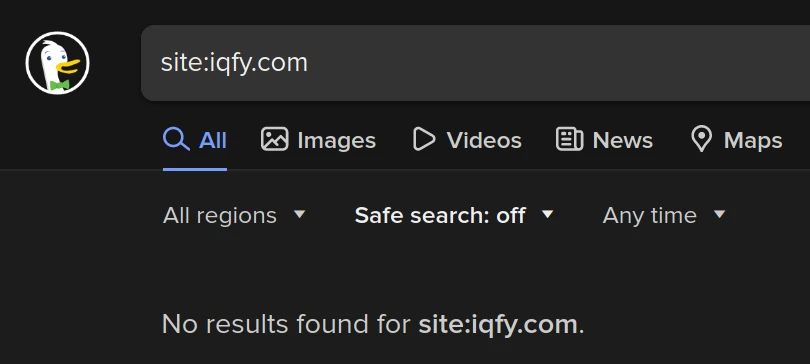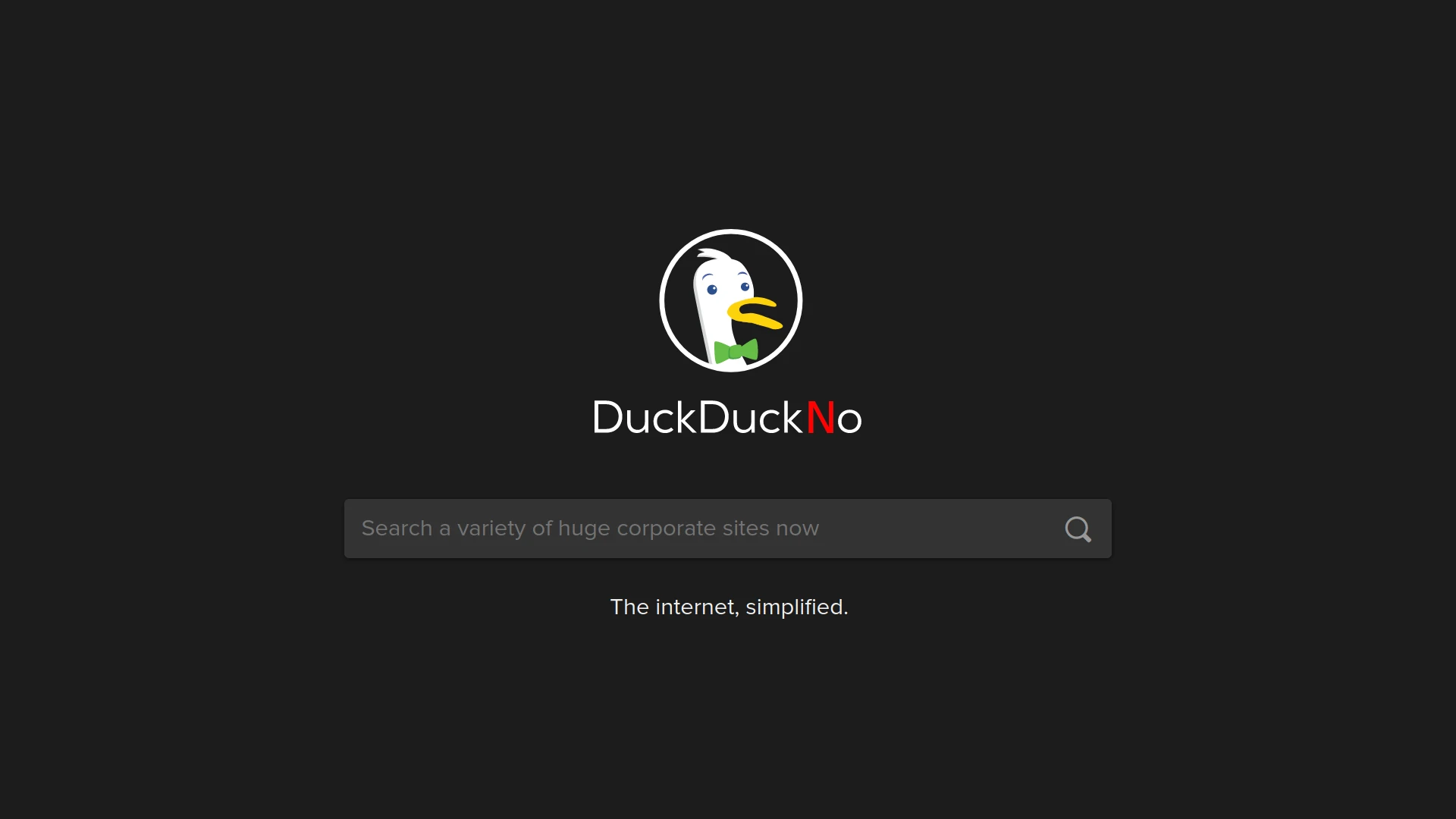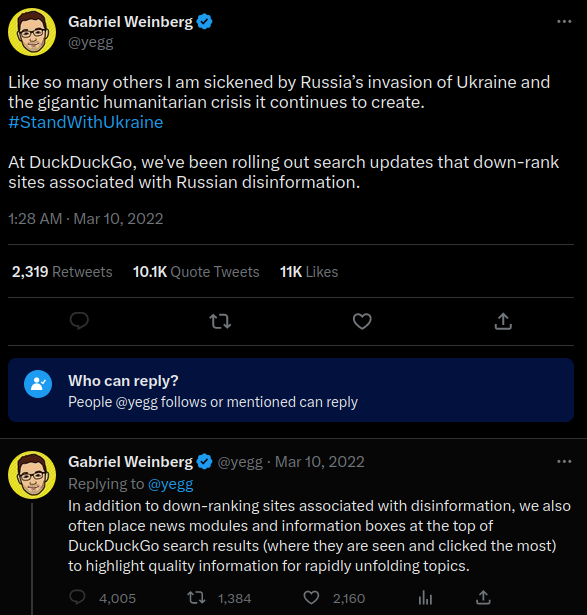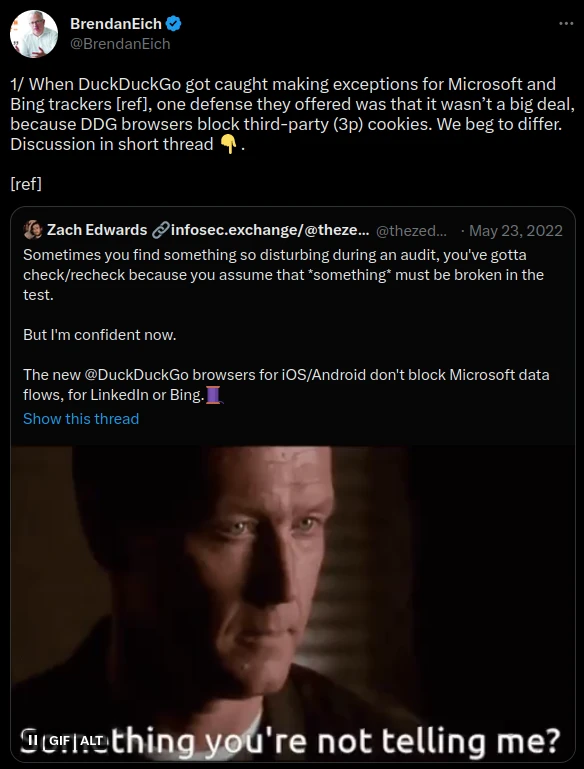You've probably seen the ads, and the (very expensive) Promoted Tweets, and maybe even the billboards. DuckDuckGo has spent a medium sized country's worth of GDP marketing itself as the privacy-conscious alternative to Google, promising users a tracking-free and unbiased search experience. But the past year has revealed that DuckDuckGo isn't actually concerned with free speech or privacy -- or any principle for that matter.
In fact, DuckDuckGo is nothing more than a tech grift designed to exploit less tech savvy users' privacy concerns for profit.
You should never use DuckDuckGo. It's not a legitimate alternative to Google or any other search engine. Here's why.

DuckDuckGo is censored. Heavily.
Before 2022, DuckDuckGo was able to provide relevant search results by combining the results from various crawlers, like Bing and Yandex, and the search experience and results were generally good. However, in early March 2022, DDG CEO Gabriel Weinberg initiated what would become a large scale internal wrecking campaign -- by suspending its partnership with Yandex. Yandex is the largest Russian-focused search engine, but its proprietary web crawler provides relevant search results even beyond the Russian-speaking world.
The reason given for the removal of Yandex results was the war in Ukraine. Despite being the largest technology company in Russia, Yandex is not owned by the Russian government, and has even attempted to distance itself from Russia. The consequence of Weinberg cutting ties with Yandex was a less reliable search results and a diminished user experience.
But the reduction in scope and relevance of DDG's search results wasn't enough. Later that month, Gabriel Weinberg announced an unprecedented wave of censorship of the internet.
"At DuckDuckGo, we've been rolling out search updates that down-rank sites associated with Russian disinformation," he wrote at the time.
"In addition to down-ranking sites associated with disinformation, we also often place news modules and information boxes at the top of DuckDuckGo search results (where they are seen and clicked the most) to highlight quality information for rapidly unfolding topics," he continued.
It was an admission, but it was also a half truth and a lie. The sites on DDG's hit list wouldn't be "downranked" -- they would be scrubbed entirely. And the sites wouldn't be Russian disinformation spooks -- they would be outlets and blogs that someone inside DDG didn't like for whatever secret reason. Even lifestyle sites like the one you're reading now.
Believe it or not, but at some point, one of our articles about kitchen hacks to reduce food waste and a primitive ChatGPT ancestor's ideas for sex positions ticked off someone at DDG, and now the search engine simply tells people searching for our articles that we don't exist.

There were many targets. Almost overnight, it felt as if half the internet had dropped past the event horizon of a black hole. Even when specifically searching for sites you know exist -- the site: qualifier asks for only results from the named domain -- DDG will pretend it can't be found. Doesn't exist, and stop looking, comrade.
A spokesperson for DuckDuckGo handwaved this away by claiming it's not "censorship" to hide sites they don't like. They also doubled down on their conspiracy theory about Russian spooks; the censored sites were now "active disinformation campaigns."
“This isn’t censorship, it’s just search rankings. DuckDuckGo is not censoring results," the DDG spokesperson said. "We are simply using the fact that these sites are engaging in active disinformation campaigns as a ranking signal that the content they produce is of lower quality, just like there are signals for spammy sites and other lower-quality content.”
Click around our site for a bit. Do you see any active disinformation campaigns, or even anything about Russia? In fact, the only vaguely related article we have is 46 things I learned from being gulaged which looks at the depravity of the USSR's gulag system through a survivor's accumulated lessons in humanity.
DuckDuckGo also around this time began strongly favoring results from a handful of big established news websites, regardless of whether or not they were relevant -- an objectively worse user experience.
At this point, no matter which consumer-useful metric you use, DuckDuckGo is just worse than any of the bigger search engines. But we're just getting started here.
DuckDuckGo sends your data to Microsoft
So DuckDuckGo and Weinberg abandoned their former principled commitment to being "unbiased," but at least you can expect privacy from the "privacy search engine," right? Unfortunately not.
DuckDuckGo users are falsely led to believe that they are not being tracked, when DuckDuckGo actually has a partnership with Microsoft to provide advertisements and supplement its search results with Bing's search results. It's a mere technicality that DuckDuckGo itself doesn't track you (if true at all), because DuckDuckGo has no all-encompassing block on Microsoft's tracker.
According to Weinberg: "Unfortunately, our Microsoft search syndication agreement prevents us from doing more to Microsoft-owned properties. However, we have been continually pushing and expect to be doing more soon."
In a Reddit post, Weinberg reiterated that DuckDuckGo is "contractually restricted" by Microsoft from stopping them from tracking and selling your data to third parties without users' consent. Ironically, perhaps they wouldn't need to be so reliant on Microsoft's search results if they hadn't ended their partnership with Yandex. By cutting ties with Yandex in the name of censorship, they've become more reliant on Microsoft, which is a blow to privacy.
Brave CEO Brendan Eich, who runs an alternative tech company with a search engine of its own, rebuked Weinberg.
When DuckDuckGo got caught making exceptions for Microsoft and Bing trackers [ref], one defense they offered was that it wasn’t a big deal, because DDG browsers block third-party (3p) cookies. We beg to differ.
The thing is, DDG browsers also include exceptions for how MS trackers circumvent 3p cookie blocking. Trackers try to get around cookie blocking by appending identifiers to URL query parameters, to id you across sites. More on how Brave protects you: https://brave.com/privacy-updates/5-grab-bag/
DDG knows how trackers do this. How do we know? Because DDG's browser blocks Google, Facebook, and others from doing it. DDG removes Google’s gclid and Facebook’s fbclid. Test it yourself by visiting https://example.org/?fbclid=sample in DDG’s macOS browser. The `fbclid` value is removed.
However, DDG does not apply this protection to Microsoft’s “msclkid” query parameter. MS's documentation specifies that msclkid exists to circumvent 3p cookie protections in browsers (including in Safari’s browser engine used by DDG on Apple OSes).
The list of URL query-parameters DDG blocks is public, and can be found in their source code. As you can see, Google's are blocked, Facebook's too, as are others. Microsoft's, conspicuously, are not blocked.
Why does DDG exempt Microsoft’s tracking parameter from being stripped? Because it is the cookie-less way that Bing ads track users, and DDG's search ads partner is Bing. DDG search lets Bing circumvent tracking protection; DDG’s browsers enable this circumvention for revenue.
We think best practice for a privacy brand is to put user privacy above all, including partner demands for user-identifying tracking exceptions as revenue quid pro quo. This is what @Brave does: Brave categorically does not and will not harm user privacy to satisfy partners.
Despite the backlash, DuckDuckGo is still using Microsoft to deliver advertisements.
Related: Bad news if you use DuckDuckGo -- it was tracking you
DuckDuckGo's dubious donations
DuckDuckGo makes a nice profit from tracking users for advertisements and acting as a gatekeeper for mainstream media, and it sets aside a portion to make donations every year. However, its donations don't go toward organizations that are squarely focused on free speech and privacy; instead, its donations tend toward organizations that produce strange social justice screeds about "Blackbodies" "dismantling racial capitalism."
For example, DuckDuckGo donated $25,000 to C2i2, which is a "critical internet studies community committed to social justice, policy, and human rights." This "critical internet studies community" has programs like the Minderoo Initiative, which "investigates the social impact and harms of technologies on the public good" and supports projects that examine the "intersection of tech and power." With DuckDuckGo's money, the Minderoo Initiative has directly funded projects like "The Future is Intersectional: Black Women Interrogating Technology," "Oracle for Transfeminist Technologies," as well as a curation of poems and articles from "Marxists, Wynterians, [and] Black speculative fiction" writers that is meant to provide "abolitionism" for "data bodies" and "dismantle racial capitalism."
Among DuckDuckGo's top recipients every year is the Electronic Frontier Foundation, a front organization that hails itself as the internet's defender of "free speech" and "democracy" -- but is not for either in practice. A recent and typical example of their activity is when they celebrated and endorsed the coordinated suspension of former President Donald Trump by all major social media platforms. Yet EFF blasted new Twitter owner Elon Musk for prioritizing free speech and subscription revenue over censorship and "protecting vulnerable users."
DuckDuckGo also donated $25,000 to Algorithmic Justice League, which funds research into how "unchecked, unregulated and, at times, unwanted, AI systems can amplify racism, sexism, ableism, and other forms of discrimination." In other words, the AJL supports censorship of speech and regulation of artificial intelligence. One of the programs AJL funds with DuckDuckGo's money is "Drag Vs AI" with the tagline "Get Ready to Drag the Cistem!"
Alternatives to DuckDuckGo
We recommend using the Brave search engine instead of DuckDuckGo.
 UFOs Are A Psyop Shirt $21.68 |
 |
 UFOs Are A Psyop Shirt $21.68 |



